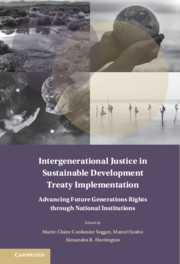 Intergenerational Justice in Sustainable Development Treaty Implementation
Intergenerational Justice in Sustainable Development Treaty Implementation Book contents
- Intergenerational Justice in Sustainable Development Treaty Implementation
- Treaty Implementation for Sustainable Development
- Intergenerational Justice in Sustainable Development Treaty Implementation
- Copyright page
- Contents
- Figures
- Tables
- Notes on Contributors
- Foreword
- Acknowledgements
- Abbreviations and Acronyms
- 1 Introduction
- 2 The Theoretical Framework for International Legal Principles of Intergenerational Equity and Implementation through National Institutions
- Part I Introduction to Treaty Law on Intergenerational Justice and Codifying Sustainability
- Part II Key Challenges in Domestic Implementation of Intergenerational Justice
- Part III Law and Policy Innovations for Intergenerational Justice
- Part IV Implementing Sustainability through National Institutions: Case Studies
- Part V Regional Trends in Intergenerational Justice
- Part VI Future Trends
- Afterword
- Table of Authorities
2 - The Theoretical Framework for International Legal Principles of Intergenerational Equity and Implementation through National Institutions
Published online by Cambridge University Press: 15 October 2021
- Intergenerational Justice in Sustainable Development Treaty Implementation
- Treaty Implementation for Sustainable Development
- Intergenerational Justice in Sustainable Development Treaty Implementation
- Copyright page
- Contents
- Figures
- Tables
- Notes on Contributors
- Foreword
- Acknowledgements
- Abbreviations and Acronyms
- 1 Introduction
- 2 The Theoretical Framework for International Legal Principles of Intergenerational Equity and Implementation through National Institutions
- Part I Introduction to Treaty Law on Intergenerational Justice and Codifying Sustainability
- Part II Key Challenges in Domestic Implementation of Intergenerational Justice
- Part III Law and Policy Innovations for Intergenerational Justice
- Part IV Implementing Sustainability through National Institutions: Case Studies
- Part V Regional Trends in Intergenerational Justice
- Part VI Future Trends
- Afterword
- Table of Authorities
Summary
More than thirty years ago the article entitled ‘A Planetary Trust: Conservation and Intergenerational Equity’ appeared, and the book In Fairness to Future Generations was published more than twenty-five years ago. Since then much has happened. As society has gained greater scientific understanding of the environment and of climate change, it has become ever more aware that what is done today affects the future of the planet and that actions in one place have far-reaching effects elsewhere. Society has also turned its attention towards the local level and has begun to focus on what actions must be taken domestically, within and across countries, to ensure equity for both present and future generations. New institutions are now devoted to sustainable development and future generations, and the principle of intergenerational equity is included in many national and sub-national judicial decisions.
- Type
- Chapter
- Information
- Intergenerational Justice in Sustainable Development Treaty ImplementationAdvancing Future Generations Rights through National Institutions, pp. 16 - 44Publisher: Cambridge University PressPrint publication year: 2021
